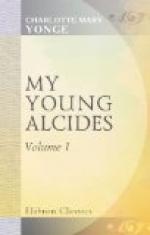I waited till Harold came down with Dora; and to my “How could you?” and Eustace’s more severe and angry blame, she replied, “He wanted me; so of course I went.”
Harold said not a word in defence of her or of himself; but when I asked whether she had been of any use, he said, smiling affectionately at her, “Wasn’t she?”
Then we went and looked at the shattered houses, and Harold showed us where he had drawn out his poor friend, answering the aggrieved owners opposite that there would be an inquiry, and means would be found for compensation.
And when I said, “It is a bad beginning for the Hydriot plans!” he answered, “I don’t know that,” and stood looking at the ruins of his “Dragon’s Head” in a sort of brown study, till we grew impatient, and dragged him home.
CHAPTER IV. THE WRATH OF DIANA.
Harold did not like clergymen. “Smith was a clergyman,” he said, with an expressive look; and while George Yolland had his brother and the nurse I had sent, he merely made daily inquiries, and sometimes sat an hour with his friend.
Mr. Crosse’s curate had kindred in Staffordshire, and offered to exchange a couple of Sundays with Mr. Benjamin Yolland, and this resulted in the visitor being discovered to have a fine voice and a great power of preaching, and as he was just leaving his present parish, this ended in Mr. Crosse begging him to remain permanently, not much to Harold’s gratification; but the two brothers were all left of their family, and, different as their opinions were, they were all in all to each other.
The agreement with Mr. Crosse would hardly have been made, had the brothers known all that was coming. George Yolland was in a strange stupefied state for the first day or two, owing, it was thought, to the effects of the gas; but he revived into the irritable state of crankiness which could not submit in prudent patience to Dr. Kingston’s dicta, but argued, and insisted on his own treatment of himself, and his own theory of the accident, till he as good as told the doctor that he was an old woman. Whether it were in consequence or not, I don’t know, but as soon as Dr. Kingston could persuade himself that a shock would do no harm, he wrote a polite letter explaining that the unfortunate occurrence from which Mr. Yolland was suffering had so destroyed the confidence of his patients, that he felt it due to them to take steps to dissolve the partnership.
Perhaps it was no wonder. Such things were told and believed, that those who had never yet been attended by George Yolland believed him a wild and destructive theorist. Miss Avice Stympson asked Miss Woolmer how she could sleep in her bed when she knew he was in the town, and the most astonishing stories of his practice were current, of which I think the mildest was, that he had pulled out all a poor girl’s teeth for the sake of selling them to a London dentist, and that, when in a state of intoxication, he had cut off a man’s hand, because he had a splinter in his finger.




